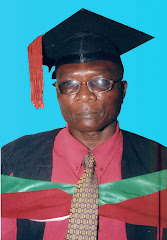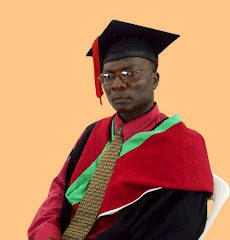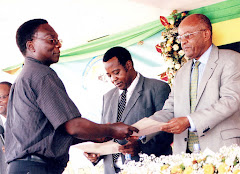Thursday, April 21, 2016
At last Kabwe reacts over his recent suspension from office
DAR
ES SALAAM City Director Wilson Kabwe, who was unceremoniously suspended by
President John Magufuli early this week in Dar es Salaam over a series of alleged corruption-tainted
malpractices, has maintained that all the contracts he signed while in office
were legal and up to scratch. With regard to his suspension from duty, Kabwe
said while he respects the president’s decision, he was ready for any
investigation into his conduct and would cooperate with investigating authorities
to prove his innocence. “The appointing authority cannot be challenged. I
respect President Magufuli’s decision,” a calm-sounding Kabwe told The Guardian
in a telephone interview. He was speaking shortly after the president announced
his suspension in typically abrupt manner during the public inauguration of the
new Kigamboni Bridge (Nyerere Bridge) in Dar es Salaam. Magufuli was responding
to an earlier narration by recently-appointed Dar es Salaam regional
commissioner Paul Makonda of alleged cheating in contracts entered between the
Dar es Salaam City Council (DCC) and contractors for various city services. The
alleged contract anomalies are believed to have cost the government billions of
shillings in siphoned-off revenue from the city’s coffers. RC Makonda cited in
particular two dubious contracts entered by DCC and different private agents
for the collection of vehicle parking fees at the Ubungo Bus Terminal (UBT) and
within the city’s central business district. He said two UBT contracts were
signed for the same purpose within 24 hours of each other in January 2005,
whereby one contract under existing 2009 legislation was signed on January 30
and another contract using a previous 2004 law was signed on January 31, using
the same agent. The contract available for scrutiny at DCC is the one under the
old 2004 law which charged 4,000/- for each bus using the terminal, but the
agent was using the amended 2009 law to charge 8,000/- per bus, indicating that
half the total revenue collected was in fact being swindled, Makonda said. “Under
the 2009 legislation which was being used to collect the fees, the revenue
should not be less than 84 million/- per month, while the (outdated) 2004
legislation presented in the city council’s books of accounts set the revenue
collection at just 42m/- per month,” the RC stated. According to Makonda, the
move has been causing the city council a loss of at least 42m/- monthly,
amounting to a total loss of 3 billion/- for the full contract period since
January 2005 to date.
The suspended former Dar es Salaam city Director Wilson Kabwe. His suspension from the office was announced at a public function by his Excellency President John Magufuli.
Both contracts were signed by Kabwe on DCC’s behalf, he
said. It had also been discovered that the same agent was still collecting the
fees a good ten months after his initial contract expired, which was contrary
to official contract regulations, Makonda added. He said in August last year,
the DCC director wrote to the agent allowing him six more months on the job
while the city council initiated a tendering process for a new agent. But just
as the six months were about to expire, the acting DCC director gave the same
agent another four months doing the same job through an official letter as the
tendering process continued. After RC Makonda completed his narration, the
listening President Magufuli wasted little time in announcing Kabwe’s
suspension on the spot and telling present officials to “send him my
greetings”. “I will not entertain such kind of leaders in my administration …
and anyone else who will be caught doing things like this will also be
removed,” Magufuli said. He directed relevant authorities to start
investigating the apparent scam further and institute legal action against all
people found to be involved. The head of state also directed that all
activities under the current UBT parking fees contract to be halted and a
proper legal process to be followed to find another agent.
MEANWHILE:
During
the 2012/13 parliamentary budget sessions in Dodoma, Members of
Parliament (MPs) became furious and wanted the government to take action against the
Director of Dar es Salaam City Council, Mr Wilson Kabwe, for various
malpractices and inefficiency. The MPs said Mr Kabwe was forced out of office
in Mbeya and Mwanza cities by councilors and the public for similar reasons,
but instead of being disciplined he was transferred to the Dar es Salaam City
Council despite mounting complaints against him. Chairman of the National Assembly,
Mr Mussa Zungu Azzan, went a step further and hinted that the matter of the
director was expected to be brought up during a meeting between the Parliament
Steering Committee and Premier Mizengo Pinda. Mr Azzan, who is also the MP for
Ilala in Dar es Salaam Region, said while Mr Kabwe was the director of Mwanza
City Council, he caused many problems which eventually led to the ruling Chama
Cha Mapinduzi (CCM) losing elections in the area. "This person has serious
problems. He caused CCM to lose elections in Mwanza and the government has been
too lax in dealing with him after all he has done everywhere he goes. He has to
go," he said. UIt was alleged that Mr Kabwe gave contracts to the company
wherever he was posted despite its being suspected of malpractices. Mr Joseph Selasini
also said that the Parliamentary Local Government Accounts Committee had already
issued complaints about Mr Kabwe but the government had so far not responded.
Tanzania unveils 100trn/- national development plan
THE government on Wednesday this week unveiled an
ambitious plan that it says will serve as a blueprint for the country's
economic and social development for the next five years. The National
Development Plan 2016/17-2020/21 aims to boost industrialisation and transform
Tanzania into a middle-income country by 2020 by pumping 107 trillion/- of
public investments into the economy. The spending earmarked by President John
Magufuli's government over the next five years has jumped by 150 per cent
compared to the previous development plan of former president Jakaya Kikwete's
administration. The new blueprint titled "Nurturing Industrialisation for
Economic Transformation and Human Development" is the latest indication of
spending plans and priorities of President Magufuli's government over the next
five years. The Minister for Finance and Planning, Dr Philip Mpango, presented
the plan to parliament yesterday and said the Magufuli government's development
blueprint over the next five years will focus on flagship infrastructure projects
such as construction of a standard gauge railway and the revival of the ailing
national flag carrier, Air Tanzania. The current five-year plan
(2011/12-2015/16), which ends in June, has been implemented by just 60 per cent
and had a total estimated budget of 44.5 trillion/-, according to official
government figures. "Some 107 trillion/- is needed to finance the
implementation of the (new) plan and development projects over the next five
years," Mpango said in his presentation to parliament. "This means
that the government will have to spend an average of 21.4 trillion/- each
year." The government has already announced that it plans to raise
spending by 31 per cent in fiscal year 2016/17 starting in July to 29.53
trillion/-. Mpango said Magufuli's government will finance 55 per cent of the
107tr/- required to finance the 2016/17-2020/21 national development plan from
its own resources. "The plan identifies two sources of funding, which are
the government's revenue and non-revenue sources and external loans and
grants," he said. The government said it would also rely on the
participation of the private sector in the implementation of development
projects. The plan expects gross domestic product (GDP) growth to rise to 10
per cent in 2020 thanks to investments in infrastructure projects from 7 per
cent in 2015. It also targets a national per capita income of $1,500 by the
year 2020 from the current levels of $1,006 (2015 figures), which would
catapult Tanzania into middle-income status. "The plan envisages an
increase of foreign direct investment (FDI) inflows into Tanzania from $2.14
billion in 2014 to $5 billion by the year 2020," he said. "The
government also expects tourism earnings to increase from $2 billion in 2014 to
$3.6 billion by 2020." Tourist arrivals are seen jumping from 1.14 million
in 2014 to 2 million within the next four years. Mpango said the government's
goal was to lift millions of Tanzanians out of poverty, noting that the state
will invest heaving in public education, water and health services over the
next five year. He revealed that more than 10 million Tanzanians out of a
population of over 47 million were currently living in conditions of abject
poverty. “Poverty has dropped from 39 per cent of the population in 1992 to
34.4 percent in 2007 and from 28.2 percent in 2012 to 24.5 percent in 2015,” he
said. He pointed out that progress in poverty reduction was a result of
improved housing, transport facilities, mobile phone penetration and ownership
as well as access to better farming inputs. Poverty in Tanzania has been fueled
by poor agricultural yields which remains the economic backbone for the
majority of the population living in rural communities, he said. Mpango told
the National Assembly that government figures show that while there is an army
of around 800,000 men and women joining the labour market annually in Tanzania,
only 200,000 of them actually get jobs. “The government plans to cut national
poverty levels from 28.2 per cent of the population in 2011/12 to 16.7 per cent
in 2020/21,” he said. The national development plan envisions that the
government will reduce the child mortality rate from 81 per every 1,000 live
births in 2014/15 to 45 in 2020/21. Similarly, the maternal mortality rate is
forecast to drop to 250 per every 100,000 live births in 2020 from 432 in 2014.
The finance minister said the government also plans to improve access to clean
and safe water in rural communities to 80 per cent and subsequently increase
electricity access to 60 per cent countrywide from the current 36 per cent. Members
of parliament yesterday started debating the government's second development
plan, which will replace the first plan that ends in June and vote whether or
not to approve the blueprint.
US envoy warns on political situations in great lakes
THE Great Lakes region could experience mass violence
and economic crisis caused by the unfolding political situations in Burundi and
the Democratic Republic of Congo (DRC), the US special envoy for the region
told The Guardian in an exclusive interview yesterday. Speaking in Dar es
Salaam, envoy Thomas Perriello noted that as the atmosphere of public unrest
tied to politics remains serious in Burundi, a similar situation of political
turmoil and conflict could also arise in the DRC. Says
Tanzania, as current chair of the East African Community, has a potentially
influential role to play in ensuring peace and stability prevails across the
Great Lakes region And as the current chair of the East African Community
(EAC), Tanzania therefore has a central role to play in ensuring that peace and
stability prevails across the region despite the threatening situations in the
two neighbouring countries, Perriello said. According to the US envoy, the
recent naming of former Tanzanian president Benjamin Mkapa as the new Burundi
mediator has raised hope that a peaceful solution will soon be found for the
tiny country’s simmering political crisis. He noted that hardline opposition
stances against President Pierre Nkurunziza’s extended rule were getting
stronger and stronger within the country, and said the US government
appreciated the role Tanzania has played in accommodating a huge influx of refugees
from the troubled country. But even with Tanzania’s generosity and hospitality,
the main hope is to eventually see the Burundi situation being stabilized so
that the refugees can eventually go back home and live there in peace, the
envoy added. On the DR Congo situation, he said this was also raising concern
about the chances of maintaining regional stability. Here again, according to
Perriello, Tanzania has a potentially influential role to play given the fact
that current DR Congo president Joseph Kabila spent most of his growing-up
years in the country. He also cited South Africa as another country that can
play a big role in bringing about peace in the region.
Former Tanzania President Benjamin Mkapa
The US envoy pointed to
lessons learnt from the “unfortunate” Burundi episode which appear to suggest
that whenever country leaders try to tamper with their national constitutions
in order to stay in power, the effects can be disastrous. He said the situation
could be replicated in DR Congo “should the constitution so much cherished by
its people be side-tracked.” “(The US government) is very concerned about what
could happen in the DRC because if the people’s voice is spurned in this
matter, the outcome could overshadow everything else, given the sheer size of
the country,” Perriello said. But the world remains hopeful that the DRC
leadership issue will also be solved in a democratic manner that respects the
country’s constitution, he added. The DRC is set to hold its general elections
this year, but it is not clear yet if President Kabila will indeed be seeking
to stay in power, as he indicated some years back. Said Perriello: “I have
travelled throughout the Congo and people are very excited of the opportunity
(provided by the constitution). Not out of disrespect of President Kabila, but
out of appreciation that he himself participated in bringing about the country
from out of war to the present situation.” He said if Kabila chooses to stay in
power after ending his tenure in December this year, it could cause Africa’s
second largest country to descend into cataclysm. “The crisis in Burundi and
the possible crisis in the DR Congo are crises of choice and not of necessity,”
the US envoy said, asserting that they are crises manufactured by leaders
meddling with the constitution in order to cling to power. Speaking about the
Great Lakes Region in general, Perriello said the continued warfare between
various armed groups were more or less taking on a regional character with the
possibility of other countries being drawn into the conflicts. These are the
most challenging matters for the region, along with infrastructural
development, investment in education, and general social transformation, he
said. There have been some achievements in the region since he assumed the role
of regional envoy last year, he added. For example, he continued, the crisis in
Burundi has been prevented from blowing up into mass violence, while efforts
are continuing to contain the DRC armed groups from assuming a regional
character and transform the region with social and economic investments. He
also noted that the continued political crises in the region had caused the
prices of minerals produced locally to go down, raising the chances of an even
more serious economic crisis eventually settling in.
Ugandan pipeline engineers tells Tanzanians about pipeline route
THE recommended Tanzanian route for a planned key
pipeline from Uganda will allow that country to start exporting its crude oil
to the world market via the Indian Ocean by mid-2020, while an alternative
route through Kenya would take the project until at least 2022 to complete,
Ugandan technocrats have explained. A leaked official report following recent
negotiation meetings in Kampala has further confirmed that the Ugandan experts
decided on the Tanzanian route to the port of Tanga as by far a better option
than the Kenyan one to the port of Lamu. Both Ugandan and Kenyan media outlets
yesterday cited the document, dated April 11 this year, as proof that Tanzania
had been chosen for the pipeline despite spirited lobbying by a Kenyan
delegation that was camped in Kampala since last month. “The comprehensive
analysis of the different options, studies and due diligence results has been
completed. The Kabaale (Uganda) - Tanga route is the only option to secure
first oil export by mid-2020, with pipeline availability of 99 per cent,” the
experts’ report was quoted as saying. According to the permanent secretary in
the Ministry of Energy and Minerals, Prof Justin Ntalikwa, who was part of the
Tanzanian delegation to the Kampala talks, the proceedings began with a meeting
of the respective technical committees from all three countries involved
(Uganda, Tanzania, and Kenya). This was followed by another meeting involving
the permanent secretaries of the ministries responsible for energy matters from
the three countries, and finally a meeting of the ministers themselves, Prof
Ntalikwa told The Guardian last week.
Presidents John Magufuli of Tanzania and Yoweri Museveni of Uganda. The two met during EAC heads of state meeting in Arusha in February this year.
The official submission and signing of
the contract for pipeline construction to commence will take place during the
East African Community (EAC) Heads of State summit which begins tomorrow in
Kampala, the PS said. The wrangle between Tanzania and Kenya for the
potentially lucrative pipeline project has been simmering since early March
when President John Magufuli and his Ugandan counterpart Yoweri Museveni
announced that they had reached a concrete deal on the matter. This was
followed days later by a formal assurance from one of the key sponsors - the
French oil firm Total – that the funds needed for the project (around $4
billion) was already available for construction to begin as soon as everything
was all set. Kenyan authorities were obviously not very happy with these
rapid-fire developments, especially since Uganda had earlier been in tentative
talks with them over the same pipeline deal. It has since transpired that
serious security issues, the extraordinarily rough Rift Valley terrain, and
land acquisition hurdles had also been tagged as major disadvantages of the
proposed Kenyan route. The pipeline is thus set to link rich oil fields in
land-locked Uganda’s Lake Albert basin with the Indian Ocean coast via Tanga,
creating an estimated 1,500 direct and 20,000 indirect jobs while increasing
Foreign Direct Investment (FDI) to Tanzania by more than 50 per cent per annum.
Upon completion, it will have the capacity to transport up to 200,000 barrels
of oil per day, according to the project blueprint. It is estimated that there
are about 6.5 billion barrels of oil accessible in Lake Albert, with 1.4 -1.7
billion barrels already confirmed as recoverable and available for
transportation.
Tanzania keen on indicative school fees
THE government has reiterated its commitment to
enforce control on school fees charged by private schools in the country to
eliminate the notion of business in education. The Deputy Minister for
Education, Science, Technology and Vocational Training, Eng. Stella Manyanya
yesterday informed Parliament that consensus on school fees would be reached
through open discussions among stakeholders. These include schools owners,
parents/guardians, legislators, the government and others. “It is true that in
some cases the element of profit making in education provided in private
schools was discerned. In-depth assessment of the school fees charged is
absolutely necessary to authenticate the balance between the services provided
and fees demanded. There are schools demanding 9.4m/- a year. We have to strike
a balance,” Manyanya clarified. She was responding to a basic question by
Halima Mdee (MP –Kawe, Chadema) who demanded clarification from the government
on findings regarding the unit cost of a student/pupil in a private school as
indicative to reasonable fees. Posing the question on behalf of Halima Mdee,
Suzan Lyimo (Special Seats- Chadema) challenged the government to make the
necessary improvement of public schools to allow convenient admission of
students.
“Evident measures have been taken and some are still underway to make
sure that all public primary and secondary schools are brought up to standard.
More than 6bn/- has been set aside for the purchase of desks and other basic
teaching materials. I call upon legislators to give serious consideration to
costs involved in education which is a burden to many families,” she said. She
said preliminary investigations conducted by the government on fees charged in
private schools, both primary secondary, revealed huge divergence depending on
the facilities, school location, the infrastructure and related services
offered. Consultation was made with some institutions managing private schools,
she added, with the findings used as guideline to the grouping of these schools
in appropriate categories for recommendation of corresponding school fees. Former
deputy minister for education, Phillip Mulongo who is also owns private schools
called for fair negotiations as the government undertakes standardisation of
school fees charged in private schools. “Mutual understanding is necessary in
the course of discussion on the recommended school fees. It should be taken
into consideration that some school owners received bank loans and are obliged
to honor repayment,” Mulongo pleaded. Deputy Minister, Prime Minister’s Office,
Regional Administration and Local Government, Suleiman Jaffo concluded the
debate by insisting that the basic focus in cooperation between different
stakeholders was to attain broader achievements in education for the benefit of
the nation.
Subscribe to:
Posts (Atom)













